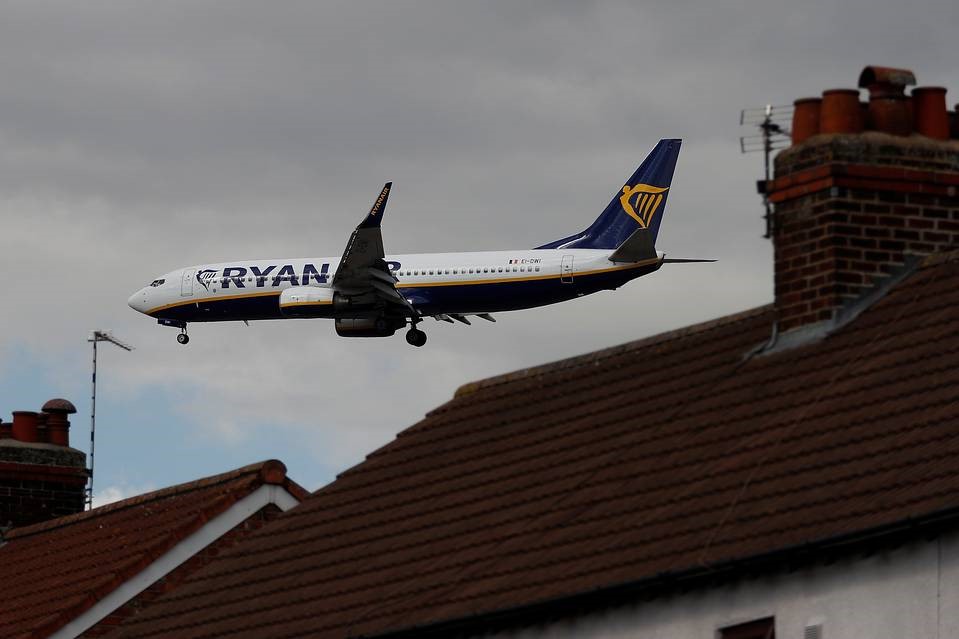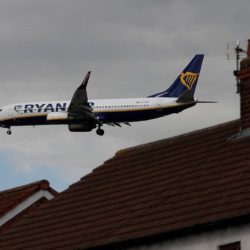The vote to leave the European Union will force companies and executives to adjust to a new landscape

A Ryanair plane prepares to land at Manchester Airport in Manchester, northern England. Ryanair Chief Executive Michael O’Leary had been sanguine about the prospects for his airline whichever way the referendum went. Nonetheless, he had been outspoken for a ‘remain’ vote. PHOTO: REUTERS
By ROBERT WALL
Updated June 24, 2016 12:20 a.m. ET
LONDON—Executives from Europe Inc. woke up Friday to a new world.
British voters chose to leave the European Union, British broadcasters forecast, defying months of pleas from the country’s biggest corporate titans, who wanted to remain in the bloc.
Most major companies based in Britain, and many in Europe and as far away as Asia and the U.S. have warned a British exit from the EU would sow widespread uncertainty that would hurt profits and endanger jobs: Britain might be forced to renegotiate trade pacts, country-by-country, to maintain current export and import tariffs, they said. The free flow of labor across the English Channel could ebb. If the vote causes long-term market turmoil, economic growth—and company profits—could take a hit for years to come.
But many British small-business owners had instead pushed for leaving the European Union, saying British business is better off unencumbered by regulations made in Brussels.
Rachel Meadows, proprietor of Katie’s Garden, a tea room in downtown Sunderland, a northeast city that reported a better-than-expected Leave turnout early in the evening, said she voted to exit. But friends who work at a local Nissan Motor Co. car factory were worried that a leave vote could threaten their jobs, she said.
“They think it will be terrible,” she said.
Ahead of the vote, executives said they were readying for an early wake-up call to check results, watch for market impact and reassure clients and employees.
Paul Frampton, chief executive of Havas Media Group UK, a unit of French advertising giant Havas SA, said he planned to be up by 5 a.m. to check results. He is expecting to fly to London on Friday and wants to be available to communicate to clients and employees depending on the vote.
“The uncertainty is the biggest thing and offering reassurance is important,” he said.
Pierre-Emmanuel Taittinger, chairman of his family’s Reims, France-based champagne producer, plans to rise at dawn for the final results. The U.K. is the company’s biggest export market, and he closely follows fluctuations in the British pound.
“In the morning, my first call will be to my British distributor,” said Mr. Taittinger.
The process of disentangling from the EU will take up to two years. But almost immediately, executives could become buffeted by market moves out of their control.
A falling currency would affect different companies in very different ways. U.K. exporters could benefit, with their goods commanding more competitive prices overseas. But if they import parts or other input goods from outside Britain, those costs may rise. British companies with big foreign-currency debt—like U.S. dollars—could face servicing issues, warned Fitch Ratings in a recent note.
European airlines may be among the hardest hit from tumbling domestic currencies. Ryanair Holdings PLC, Europe’s largest carrier by passenger numbers, for instance, takes in most of its revenue in pounds and euros, while paying for expenses such as plane purchases and leasing in dollars.
Ryanair says it has hedged currency risk for the next two years, and Ryanair Chief Executive Michael O’Leary has said the effect on the carrier’s operations from leaving the EU would be limited. He has been outspoken for a Remain vote. “We are less likely to invest in Britain” after a split, he said earlier this year.
Hours after polls closed, Ryanair launched a fresh public broadside against leaving the EU. Amid the count, it unveiled a “Referendum Special” fare promotion, offering £9.99 (roughly $13.65, based on overnight currency trading) one-way flights for travel from October to November.
“If the Leave side do win,” the advertisement emailed to customers said, “then these will be the last low fares the U.K. will enjoy for a very long time.”
—Saabira Chaudhuri, Katherine Dunn and Sam Schechner contributed to this article.
Write to Robert Wall at [email protected]

Comments are closed